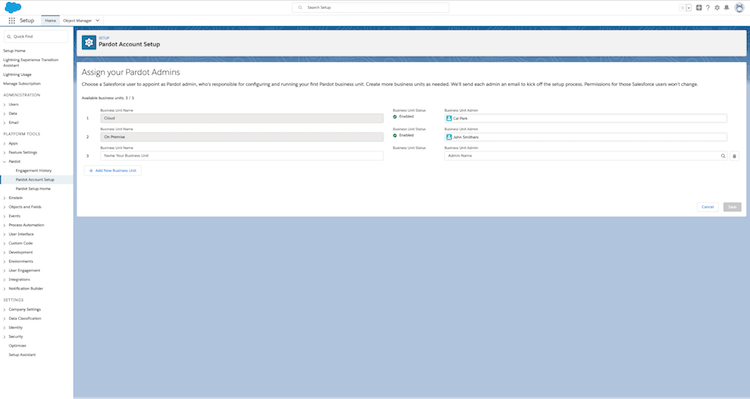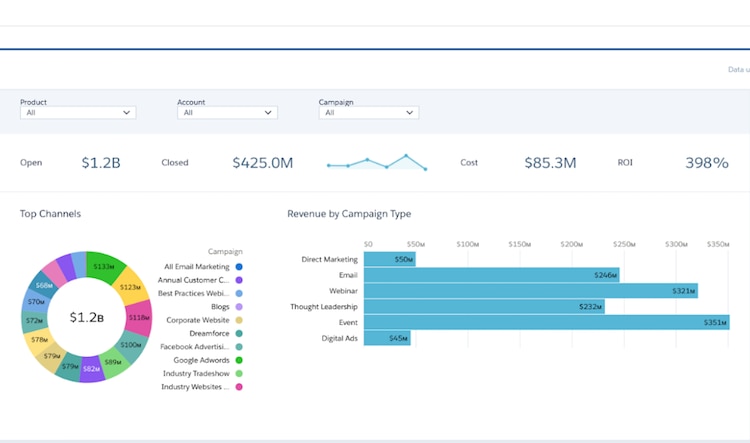Introducing Pardot Business Units – Personalized Enterprise B2B Marketing at Scale



Today, we’re launching Pardot Business Units to provide regional teams and sub-brands the tools they need to reach their own segmented audiences. Learn more about how these new features further expand our enterprise-grade marketing automation and personalization) solution.
It’s clear that the future of marketing is no longer just automation, but personalization. The more targeted a message is, the better. Yet, enterprise marketers face a perpetual tug-of-war — how to balance the need for a centralized brand and message, while giving marketers from regional teams or sub-brands enough flexibility to execute tailored, localized campaigns that resonate better with their customers.
Pardot became part of Salesforce in 2013 and since then, we’ve helped enterprise marketers scale and connect with sales teams on the same platform–empowering them to be more aligned and move faster. Last year, we introduced intelligent account-based marketing (ABM) capabilities, giving enterprise marketing teams the detailed insights needed to customize campaigns for priority accounts. However, the needs of B2B marketing teams are continually evolving, so today we’re introducing new features to further expand our enterprise-grade marketing automation (and personalization) solution.
Introducing Pardot Business Units
Today, we’re launching Pardot Business Units to provide regional teams and sub-brands the tools they need to reach their own segmented audiences. Sub-brands or regional teams face a particular challenge every day–they lack insight into the overall marketing experience that prospects have with a multi-brand company. All too often, marketing teams must choose between scale (mass outreach with less personalization) and agility (tailored interactions with less coordination) when planning campaigns. The result? Customers might receive multiple points of contact across brands on a given day that are inconsistent or repetitive, rather than the seamless experience they’d expect from a single company.
Now with Pardot Business Units, companies can easily designate audiences for brands, geographies, or lines of business to better tailor campaigns for specific groups while still getting a complete view of the customer experience – all within a single Pardot implementation. This gives marketing teams better visibility into overlapping outreach efforts. This ensures they’re reaching out to the right targets and limits the need for duplicate prospect profiles to support compliance with regulatory requirements.

For example, a multi-brand manufacturing company can segment their customers by industries including healthcare, energy and transportation and regions to ensure they’re receiving localized, relevant campaigns. Pardot Business Units provides aggregated analytics so marketers can understand how brand or regional outreach compares to other subsets, or impacts the overall global engagement. Simplified template sharing across teams ensures consistency on the overall brand message and alignment on best practices. Business Units serves a critical need as we continue to build our enterprise-ready solutions and will be generally available in English, French, German, Spanish and Japanese in our Summer ’19 release.

Extending Salesforce Pardot with AppExchange, powered by the Salesforce Platform
As we’ve continued to deliver innovation to meet the evolving needs of the modern enterprise, we’ve also attracted new partners to help companies customize and extend how they use Salesforce Pardot. On AppExchange, the world’s leading enterprise cloud marketplace, you can find integrations like Demandbase, which extends their AI-enabled account-level data and intent signals within both Salesforce Pardot and Sales Cloud for a complete view of target accounts. Just recently 6sense announced users get time-based predictions on prospect engagement combined with the marketing power of Salesforce Pardot. Terminus enables marketers to build, operate and measure ABM programs across digital advertising channels targeted at specific Salesforce accounts based on CRM data.
Celebrating our customer Trailblazers
One of our enterprise customers, VMWare, has been on their marketing journey with us for over three years. The company saw a 641% return on investment with Salesforce Pardot providing a single source of truth between its sales and marketing teams. “Using the Salesforce marketing stack, including Pardot, enabled deployment of an entire marketing back office in less than 90 days and enabled marketing to increase our contribution to the business,” said Michael King, Senior Director of Cloud Marketing, VMWare.
This week, the Salesforce Pardot team will be at Sirius Decisions Summit. Come visit our booth if you’re onsite, or visit our product page to learn more about these latest innovations.





















